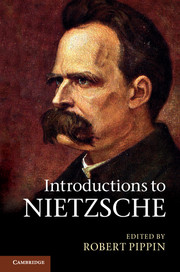Book contents
- Frontmatter
- Contents
- Note to the reader
- Chronology of Nietzsche's life and works
- Introduction
- Chapter 1 Nietzsche: Writings from the early notebooks
- Chapter 2 Nietzsche: The Birth of Tragedy
- Chapter 3 Nietzsche: Untimely Meditations
- Chapter 4 Nietzsche: Human, All Too Human
- Chapter 5 Nietzsche: Daybreak
- Chapter 6 Nietzsche: The Gay Science
- Chapter 7 Nietzsche: Thus Spoke Zarathustra
- Chapter 8 Nietzsche: Beyond Good and Evil
- Chapter 9 Nietzsche: On the Genealogy of Morality
- Chapter 10 Nietzsche: The Anti-Christ, Ecce Homo, Twilight of the Idols
- Chapter 11 Nietzsche: Writings from the late notebooks
- Select bibliography
- Index
- References
Chapter 9 - Nietzsche: On the Genealogy of Morality
Published online by Cambridge University Press: 05 June 2012
- Frontmatter
- Contents
- Note to the reader
- Chronology of Nietzsche's life and works
- Introduction
- Chapter 1 Nietzsche: Writings from the early notebooks
- Chapter 2 Nietzsche: The Birth of Tragedy
- Chapter 3 Nietzsche: Untimely Meditations
- Chapter 4 Nietzsche: Human, All Too Human
- Chapter 5 Nietzsche: Daybreak
- Chapter 6 Nietzsche: The Gay Science
- Chapter 7 Nietzsche: Thus Spoke Zarathustra
- Chapter 8 Nietzsche: Beyond Good and Evil
- Chapter 9 Nietzsche: On the Genealogy of Morality
- Chapter 10 Nietzsche: The Anti-Christ, Ecce Homo, Twilight of the Idols
- Chapter 11 Nietzsche: Writings from the late notebooks
- Select bibliography
- Index
- References
Summary
INTRODUCTION TO NIETZSCHE'S TEXT
Although it has come to be prized by commentators as his most important and systematic work, Nietzsche conceived On the Genealogy of Morality as a ‘small polemical pamphlet’ that might help him sell more copies of his earlier writings. It clearly merits, though, the level of attention it receives and can justifiably be regarded as one of the key texts of European intellectual modernity. It is a deeply disturbing book that retains its capacity to shock and disconcert the modern reader. Nietzsche himself was well aware of the character of the book. There are moments in the text where he reveals his own sense of alarm at what he is discovering about human origins and development, especially the perverse nature of the human animal, the being he calls ‘the sick animal’ (GM, III, 14). Although the Genealogy is one of the darkest books ever written, it is also, paradoxically, a book full of hope and anticipation. Nietzsche provides us with a stunning story about man's monstrous moral past, which tells the history of the deformation of the human animal in the hands of civilization and Christian moralization; but also hints at a new kind of humanity coming into existence in the wake of the death of God and the demise of a Christian-moral culture.
Keywords
- Type
- Chapter
- Information
- Introductions to Nietzsche , pp. 199 - 214Publisher: Cambridge University PressPrint publication year: 2012

